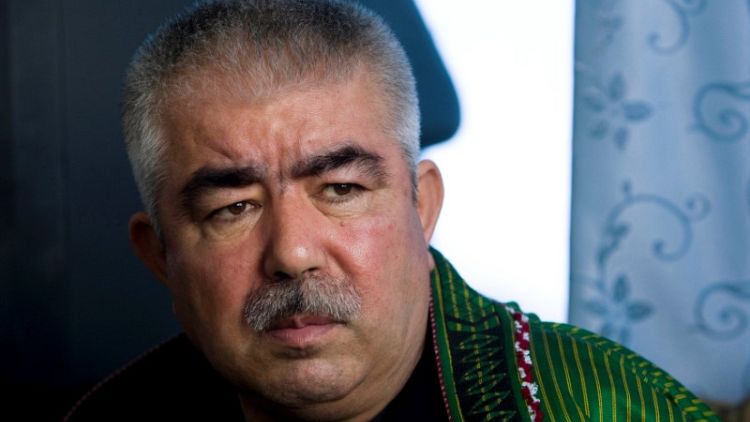MAZAR-I SHARIF, Afghanistan (Reuters) - Supporters of exiled Afghan Vice President Abdul Rashid Dostum blocked sections of the main highway linking the capital, Kabul, with northern Afghanistan on Thursday, the latest in a spate of protests against the central government.
The action followed days of demonstrations in several northern provinces that started when a militia commander loyal to Dostum was arrested after clashing with officers during a meeting with security forces.
Some three months ahead of parliamentary elections scheduled for October, the protests underscore the volatile situation facing ethnically diverse Afghanistan, even as President Ashraf Ghani's government has raised hope of steps towards talks with the Taliban.
"People are frustrated and we've been raising our voice for several days," Gul Mohammad Ayrkin, an official from Dostum's Junbish-i Milli party said.
"We've had demonstrations, protest tents but the government so far hasn't made the smallest response to people's demands."
He said the highway had been blocked in Samangan, a mountainous region neighbouring the strategic province of Balkh.
Other key points, including the road from the Hairatan border crossing with Uzbekistan, one of the main trade routes into Afghanistan, were also closed.
As protests continued in other northern regions, demonstrators also closed down offices of the National Election Commission in Faryab, Jawzjan and Sar-e Pul provinces.
Dostum, forced to leave the country following international outrage over accusations that he ordered his guards to seize a political rival and subject him to torture and sexual abuse, has been rumoured to be preparing a return to Afghanistan.
A veteran of four decades of tumultuous politics, who has changed sides many times and faced multiple accusations of human rights abuses, he commands strong support among his fellow ethnic Uzbeks, a minority group with a widespread presence across much of northern Afghanistan.
However, a return to the political scene would be a severe blow to the credibility of efforts by Afghanistan's international partners to ensure that even powerful figures are accountable for abuses.
With next year's presidential elections in sight, the standoff has highlighted the increasingly open ethnic divisions in Afghanistan where ethnic Pashtun President Ghani faces growing hostility from many ethnic Tajiks, Uzbeks and Hazaras.
(Reporting by Matin Sahak; Writing by James Mackenzie; Editing by Robert Birsel)
